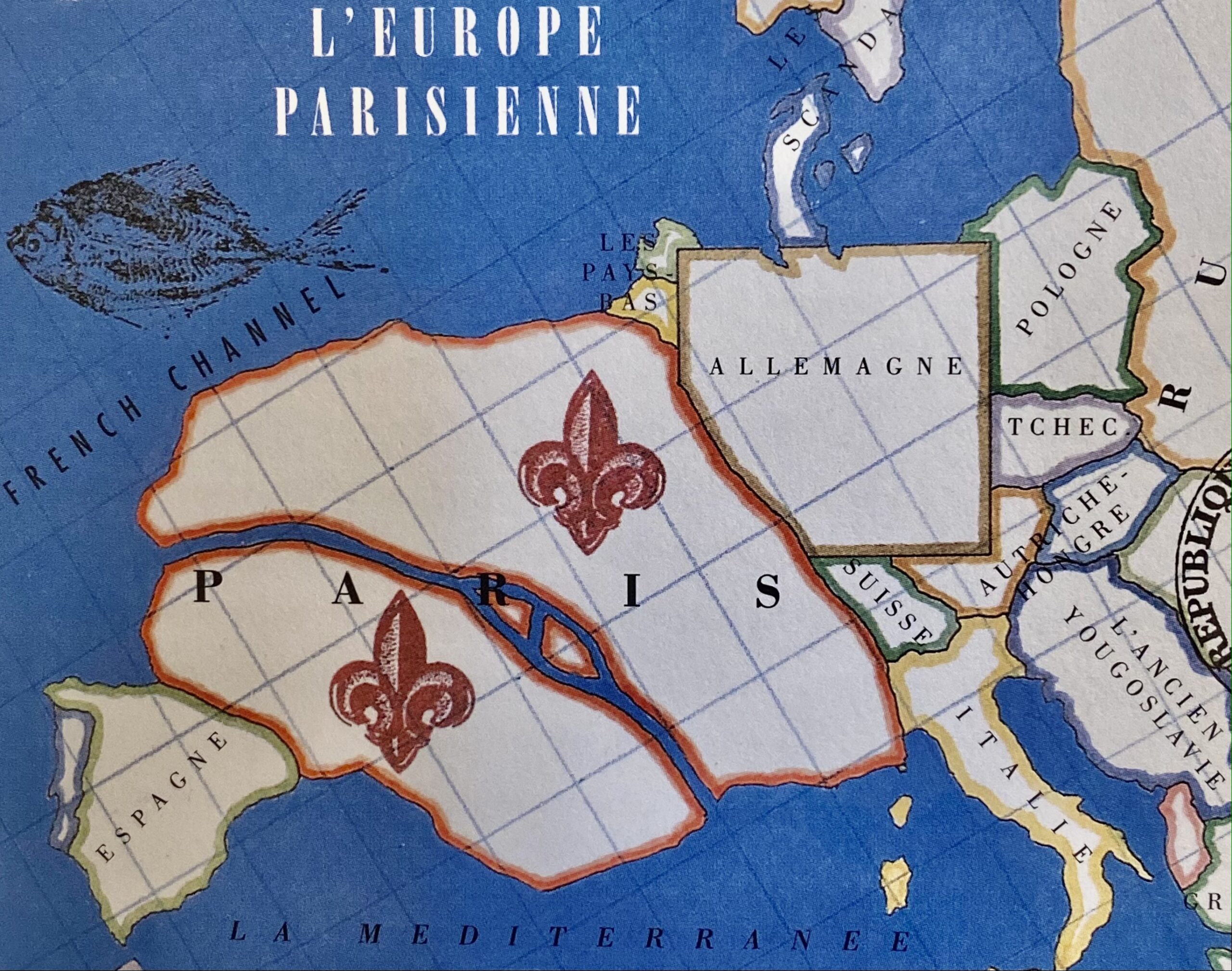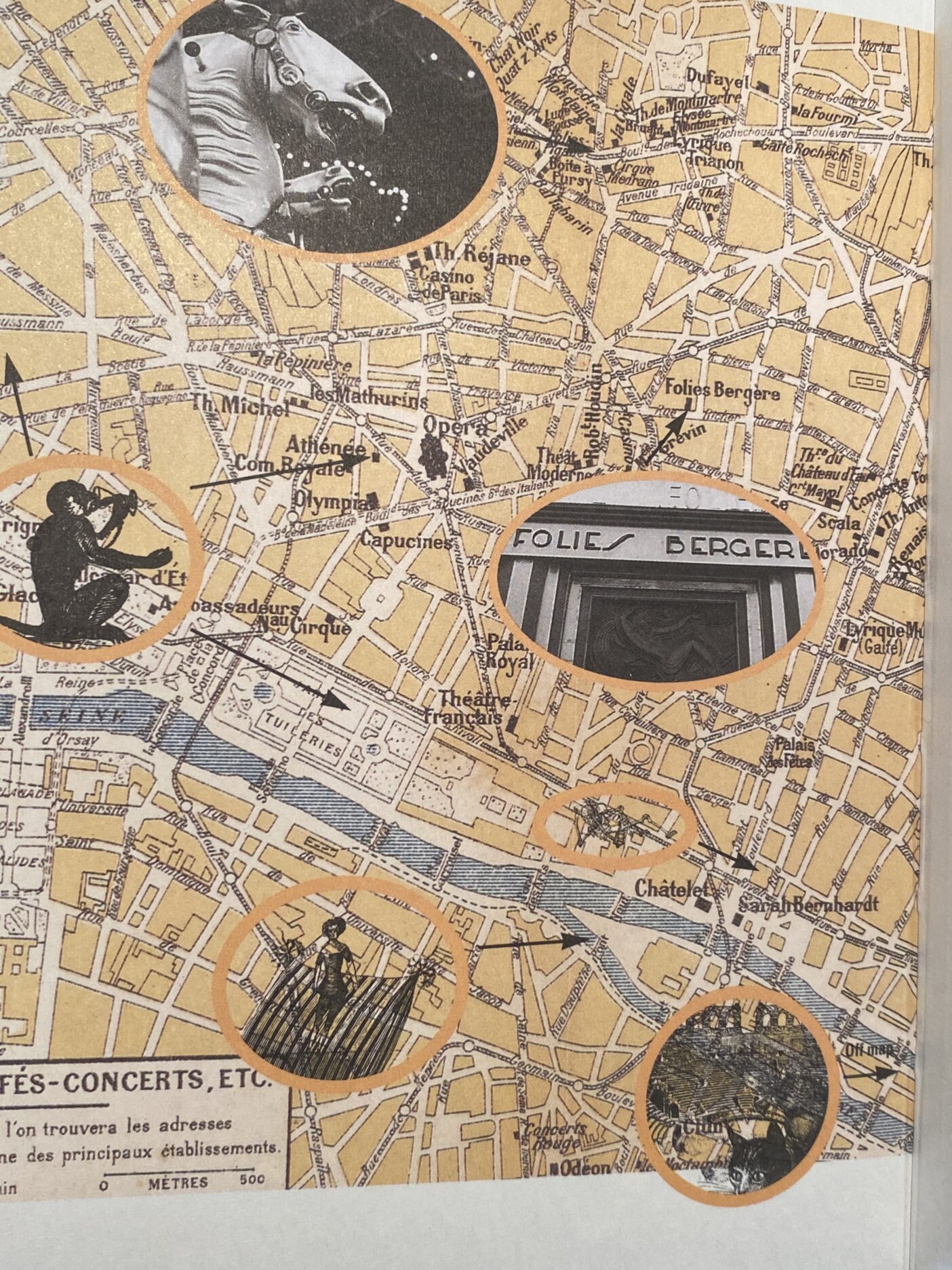Paris Out of Hand: imperdibile guida cartacea per una Parigi improbabile e paradossale
'Paris Out of Hand' è un ritratto inventato di Parigi che diventa una paradossale introduzione alla città. Una Parigi che non esiste ma potrebbe.

'Paris Out of Hand' è un ritratto inventato di Parigi che diventa una paradossale introduzione alla città. Una Parigi che non esiste ma potrebbe.

(English translation below)
Si dice che il miglior compagno di viaggio sia una buona guida cartacea, uno di quei libri che ti fa cominciare la visita già prima di partire, ti induce a programmare e a sognare – e io stesso vi ho contribuito, tanto da poter segnalare, in modo del tutto non imparziale, la mia Firenze insolita e segreta, pubblicata in cinque lingue da un editore che è l’eccellenza del settore delle guide cartacee più belle perché ti portano fuori pista, là dove nessuno ti avrebbe detto di andare.
Ma quando mi sono ritrovato fra le mani Paris Out of Hand di Karen Elizabeth Gordon, nonostante sia un libro vecchio di quasi trent’anni che non ha inaugurato un filone, ho varcato una nuova frontiera delle guide cartacee: quelle che ti prendono per mano in una città raccontandoti fantasie, luoghi immaginari ma verosimili, provocazioni rivelatrici. E infatti il sottotitolo, A wayward guide, già lascia intuire il contenuto.
Vi sono gli inevitabili suggerimenti dei migliori alberghi, salvo che nessuno di quelli elencati esiste davvero, e ciascuno ha una sua storia unica da raccontare. Come l’Hotel Rien Plus, nel quale, nei suoi settantacinque anni di attività, nessuno è mai riuscito a dormire: accetta prenotazioni, le conferma, sollecita pagamenti in anticipo, ma alla fine non accetta clienti. E per recuperare il maltolto si è invitati a rivolgersi non alla Reception ma alla Deception (delusione).
Una tale ditta non può avere un registro dei clienti ma la nostra guida riporta numerosi spassosi commenti e aneddoti lasciati dagli ospiti di altri – come l’Hotel Souci Rigoli, o quello dall’altisonante nome Crillon Sans Ascenseur – e ciascuno di essi è, a rovescio, un sottile monito di quello che il viaggiatore può aspettarsi in un albergo parigino. C’è la cacofonia linguistica dell’Hotel Helas, dove si parla solo il desesperanto, e c’è l’inatteso altro cliente dal cuore infranto che si ritrova nel proprio letto, e molto altro.
A cena, nei ristoranti di questa stravagante guida, incapperemo nelle costose alchimie della nouvelle cuisine del Le cadavre equis, dove tra l’altro anziché chefs abbiamo almeno tre o quattro artistes a cucinare ingredienti che hanno comprato con gli occhi bendati – ed è vero che in certe tavole parigine che passano per sofisticate e care, non si riesce ad avere la più pallida idea di cosa si stia mangiando.
Altre avventure attendono il lettore di Paris Out of Hand: una vita notturna piena di posti improbabili, e qualcuno anche a buon prezzo, come il Cinema Pont Neuf, da cui, muniti di biglietto regolarmente pagato, si può vedere lo spettacolo della Senna, una molteplicità di curiosi caffè, per non parlare di negozi come il Fax Food: riceve ordini in tempo reale da tutto il mondo e invia da Parigi ricette da preparare al volo e trasmesse via fax.
E se non si vuole essere in ritardo, è meglio evitare luoghi come la stazione del Metro Marquis de Sade, dove eroticamente accade un po’ di tutto. Per non parlare dei Taxi Auto da Fée.
Nella stessa toponomastica di questa Parigi inventata, ma non troppo, ritroviamo la rue des Martyres Inutiles, la rue des Enfants Normaux, la rue des Perditions pas Graves, l’Impasse de Fantômas, le Carrefour des Mots Croisées, la rue des Grosse Bêtes Ambiguës, e tutto un mondo parallelo.

È un gioco lungo, quello della Paris Out of Hand, coadiuvato da un ricco apparato di illustrazioni, mappe, schede tecniche. Una demolizione della megalomania parigina, ricca di citazioni letterarie, e un omaggio, a tratti esplicito, alla Parigi dei surrealisti e forse anche alle Città invisibili di Calvino (che può anch’esso essere eletto come un vero libro di viaggio), un ritratto della capitale francese ricco di riferimenti culturali e dai paradossi impietosi: perché è vero che capita, anche nelle migliori brasserie parigine, di ritrovarsi un topolino sotto il tavolo, di incontrare personaggi allucinanti, o di finire in alberghi improbabili eppure dai nomi altisonanti.
E a suo modo, questa è guida illuminante e più utile delle prevedibili concorrenti: per vie traverse, racconta lo spirito di Parigi, ciò che ci si può davvero attendere, il “tra le righe” della ville lumière. Il viaggiatore è avvertito, e nell’eccesso di informazioni ormai disponibili ovunque, nella frenesie dei viaggi globalizzanti, una guida per assenza, per piccole invenzioni, fortifica l’intelligenza e scardina l’esistente, invitandoci a riscrivere, noi stessi, i nostri viaggi per quello che non sono stati – eppure, un po’ sì…
ENGLISH VERSION
‘Paris Out of Hand’ is an invented portrait of Paris that becomes a paradoxical introduction to the city. A Paris that doesn’t exist but could
It is said that the best travel companion is a good guide, one of those books that makes you start your visit even before leaving, induces you to plan and dream, and then accompanies and advises you. Those books know no crisis – and I myself have contributed, with my Secret Florence, now in its fourth edition, published in five languages by a publisher who excels in the industry of the most beautiful guides because they take you off the track, where no one would have told you to go.
However, when I found Karen Elizabeth Gordon‘s “Paris Out of Hand” in my hands, in spite of being a 30 years old book that did not pushed for similar products, I crossed a new frontier of guides: those who take the reader into a city, disclosing fantasies, imaginary but plausible places, revealing provocations. There are the inevitable suggestions of the best hotels, except that none of those listed exists, but each has its own unique story to tell. Like the “Hotel Rien Plus”, in which, in its seventy-five years of activity, no one has ever been able to sleep: it welcomes and confirms reservations, requests payments in advance, but in the end does not accept customers; to recover the stolen goods, you are invited to contact not the “Reception” but the “Deception”. Such a hotel may not have a client register, but our guide reports numerous amusing comments and anecdotes left by the guests of others – such as the “Hotel Souci Rigoli”, or the one with the high-sounding name “Crillon Sans Ascenseur” – and each of them is, by reverse, a subtle reminder of what the traveller can expect in a Parisian hotel. There is the linguistic cacophony of the “Hotel Helas”, where only desesperanto is spoken, and there is the unexpected heartbroken unknown customer who is sleeping in your bed, and much more.
At dinner, in the restaurants of this extravagant guide, we will run into the expensive alchemies of the nouvelle cuisine of Le cadavre equis, where among other things instead of chefs we have at least three or four artists cooking ingredients that they bought blindfolded – and indeed in certain Parisian tables that pass for sophisticated and expensive, one is unable to have the faintest idea of what one is eating.
Other adventures await the reader of Paris Out of Hand: a nightlife full of improbable places, and some even at a good price, such as the “Cinema Pont Neuf” (from which, with a paid ticket, you can see the show of the Seine), a multiplicity of curious cafes, not to mention shops such as “Fax Food”: it receives orders in real-time from all over the world and sends by recipes from Paris to be prepared on the spot. And if you don’t want to be late, it’s best to avoid places like the “Metro Marquis de Sade” station, where a little bit of everything erotically happens. Not to mention the “Auto da Fée” Taxis.
In the same toponymy of this invented ma non-troppo Paris we find the rue des Martyres Inutiles, the rue des Enfants Normaux, the rue des Perditions pas Graves, the Impasse de Fantômas, the Carrefour des Mots Croisées, the rue des Grosse Bêtes Ambiguës, and a whole parallel world.
The guide is a long game, picturing a parallel world with the help of a rich array of illustrations, maps, technical data sheets. Armed with irony and several literary references, it aims at a destruction of the classic Parisian megalomania, being to a tribute, sometimes explicit, to the Paris of the Surrealists and perhaps also to Calvino’s “Invisible Cities” (which can also be elected as a real travel book), a portrait of the French capital full of cultural references and merciless paradoxes: after all it may happen to find a little mouse under the table even in the best Parisian brasseries, to meet hallucinatory persons, or to end up in improbable hotels yet with high-sounding names. And in its own way, this is an illuminating and more useful guide than its predictable competitors: in a roundabout way, it tells the spirit of Paris, what can really be expected, the “between the lines” of the ville lumière. The traveller is warned, and in the excess of information now available everywhere, in the frenzy of globalizing travel, this guide by absence, with its small inventions, fortifies intelligence and unhinges the existing, inviting us to rewrite our travels ourselves for what they have not been – and yet, somehow yes, they have been…
